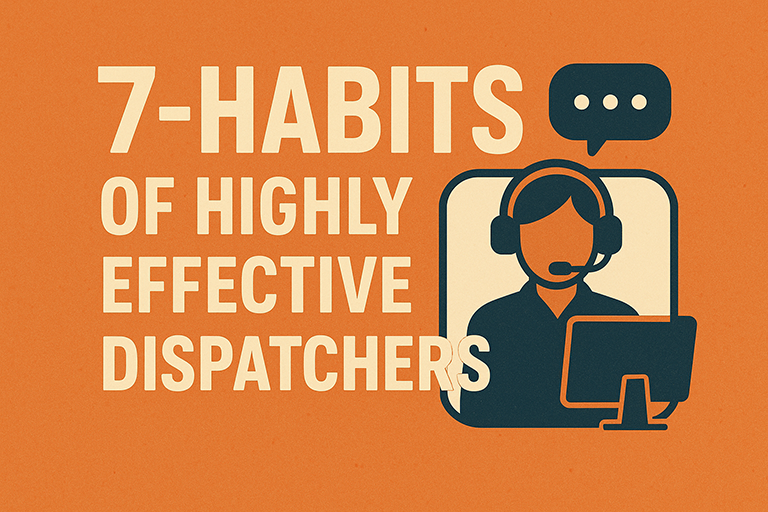In his book, The 7 Habits of Highly Effective People, Steven Covey provides great examples of how to be effective. As a PSAP Director, I grabbed one that I used all the time, the touch-it-once principle. When I was opening mail or doing tasks, I tried to just touch that document, piece of mail, once, handle it, and move on. I found these kept things moving better and more organized in my office, which was important because sometimes my office looked nothing like an organized office for people walking in!
Recently, I was thinking about this, and I wondered, what would this look like for dispatchers?
The 7 Habits of Highly Effective People by Stephen Covey is a great framework for improving personal and professional effectiveness. For 911 dispatchers, who face high-pressure, fast-paced, and often stressful situations, applying these habits can help improve decision-making, communication, and stress management. Here’s how each habit, adjusted for the daily functions of a 911 dispatcher, can be applied in the daily tasks. It should be noted, that many of these habits I have personally witnessed dispatchers using with as much ease as walking and chewing bubble gum!
- Be Proactive
- In the dispatcher role: Being proactive means taking control of situations before they escalate. For dispatchers, this could involve anticipating the needs of first responders, staying ahead of potential issues in emergency calls, and maintaining a calm, assertive approach to managing multiple tasks.
- Example: When you hear a call coming in, you can already start processing the information (e.g., location, severity) while the caller is speaking, setting yourself up to quickly send resources or make decisions based on their needs. This IS what we do! Most experienced dispatchers are excellent at this habit.
- Begin with the End in Mind
- In the dispatcher role: This means focusing on the desired outcome of every call and action. The goal is always to help resolve the situation in the safest, most efficient way.
- Example: For each emergency call, dispatchers should have a clear vision of what a successful resolution looks like (e.g., quickly locating the situation, ensuring responders are safe, and ensuring the appropriate resources are dispatched).
- Put First Things First
- In the dispatcher role: Prioritizing tasks based on urgency and importance is crucial. A dispatcher needs to distinguish between critical and non-critical situations and avoid becoming overwhelmed by less important tasks.
- Example: When multiple calls are coming in simultaneously, prioritizing the most urgent emergency (e.g., a life-threatening situation) and making sure that first responders are dispatched swiftly, while handling other calls in a timely manner. Sometimes, dispatchers may struggle to put a caller on hold to answer the next 911 incoming call. Agency procedures must be followed here, but this skill can be fine-tuned to work very well for both callers and responders.
- Think Win-Win
- In the dispatcher role: A “win-win” mindset means seeking solutions where all parties involved are supported. For dispatchers, this might mean ensuring that both first responders and the public are supported most positively and effectively.
- Example: Building rapport with callers to ensure they feel heard and understood, while also making sure that first responders get the information they need to manage the situation.
- Seek First to Understand, Then to Be Understood
- In the dispatcher role: Listening is one of the most vital skills. Dispatchers need to fully understand the emergency before responding. It’s crucial to listen to both the caller and the first responders to ensure everyone is on the same page.
- Example: When speaking with a distressed caller, actively listen, ask clarifying questions, and confirm understanding. Being careful to not embellish the situation when dispatching and do not ask the caller to unnecessarily repeat information that has already been provided.
- Synergize
- In the dispatcher role: Synergy is about working effectively with others, and in this case, it’s about collaborating with colleagues, first responders, and other agencies to create the best possible outcome for the emergency.
- Example: Working as part of a team to support each other when calls get heavy or a situation escalates. Communication and coordination with police, fire, EMS, and other agencies will help make sure everyone is on the same page.
- Sharpen the Saw
- In the dispatcher role: Taking care of yourself mentally, emotionally, and physically is crucial for maintaining performance under stress. Regular breaks, continuing education, and stress management techniques are essential for a dispatcher to maintain peak performance.
- Example: Taking breaks when possible, participating in regular training, practicing relaxation techniques to manage stress, and staying fit to handle the mental and emotional strain of the job. Weekly or monthly practice of different scenarios can make a difference when the difficult call comes into the center.
By incorporating these habits into their daily routines, 911 dispatchers can improve their effectiveness, reduce burnout, and contribute positively to the emergency response system.


Recent Comments